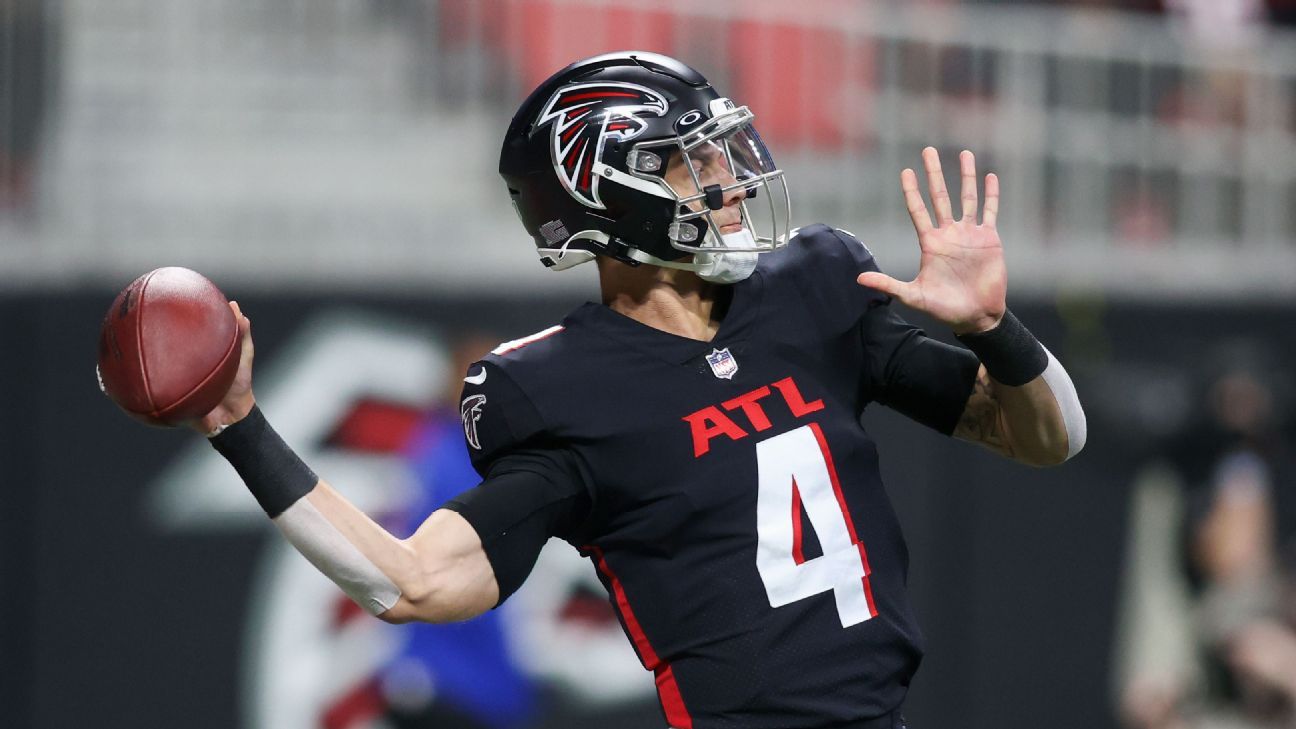ATLANTA — Desmond Ridder lingered on the Mercedes-Benz Stadium field late on a Friday afternoon. His team — now his team as the starting quarterback — had finished up a public practice about a half-hour earlier. He’d gone to sign autographs with his teammates and take pictures with fans.
And now, he hung out around the 20-yard line with his wife, Claire, and daughter, Leighton. A year ago, everything was new. He hadn’t thrown a professional pass in a game here. He was the backup trying to navigate the speed, footwork and everything involved with transitioning from a college quarterback to a professional one.
There’s still a lot to learn now, to get comfortable with. Still so much new, like being the player the team looks to in the offseason; the one leading the off-site sessions with the quarterbacks and pass-catchers. He’s settling in to becoming the starting quarterback he always believed he could be.
When Atlanta inserted Ridder as the starter in place of Marcus Mariota for the final four games of the 2022 season, he completed 63.5% of his passes and threw for two touchdowns. More importantly, Ridder threw no interceptions — a streak of 115 attempts and counting — and gained experience he couldn’t have in his first 13 games watching from the sideline.
“Those four games for me, and then obviously, coming into the offseason was crucial for me,” Ridder said. “It would be completely different if I hadn’t played one single snap last year. And then coming into this year and being named the starter.
“So having those four games under for me, just to get the feel, the speed, how it is. It was crucial for me.”
It gave him an understanding of what he needed to do and allowed him to approach the spring and summer differently.
Ridder has adjusted before, including midseason last year when he realized his learning strategy wasn’t yielding the best results. He began using Quizlet and play recitation repetition with Claire, helping him eventually become the starter.
In his studying, he learned ways to be more efficient, both on the field and in his preparation. He realized he didn’t need to be there all day, every day to accomplish everything, something echoed by his coaches in working smarter, not necessarily longer.
“Just to get up, get in early, knock it out, get everything that you need done,” Ridder said. “And then go to work.”
Ridder picks something in his game to pick at day by day. Last year, for instance, he knew he needed to know everyone’s job along with his own. This year, he has to know where each person should be on each play. Last spring, he might have worried about every pass he threw. This spring, he was more concerned with the process and whether the decision and footwork were right.
Another day, he’ll look at his stride — was it short enough or was he overstepping — and then try to alter it. He’s continuously focused on his footwork and making sure his reads are correct.
Falcons head coach Arthur Smith said Ridder made “daily improvements,” although he knows Atlanta won’t know Ridder’s exact growth until training camp, joint practices and preseason games, where there’s more contact and hitting than 7-on-7 and light 11-on-11 work with no contact.
But the Falcons saw enough in Ridder last season to make him the starter instead of pursuing other options. They liked how he adapted throughout games, how he handled critical situations like third down and red zone. Smith liked his leadership and his anticipation, comparing it to a highly skilled point guard who can see where things develop before they do.
“I think he’s got that,” Smith said. “There’s a lot of things that we may ask him to anticipate, or wait a tick, and not everybody can do that, but he can. He’s shown that so far. That gives us a lot of hope, and every system is a little bit different, too.”
The feedback Ridder gives during meetings inside the quarterback room, offensive coordinator Dave Ragone said, and the types of questions he asks, matter. It shows he’s understanding the information, another point of promise for the second-year quarterback.
“The better the questions that are coming back and the more understanding they have,” Ragone said. “The further that you can go with it.”
Last year, Atlanta went with Ridder in an offense built around a different quarterback. This year, the offense will be different, more catered to what Ridder can do. The Falcons had a plan for him from the time they drafted him: Give him a lot and see what he can handle, but don’t rush him into playing before they felt he was ready to do so.
It’s part of why the 23-year-old Ridder didn’t start until the last month-plus of last season. Atlanta built confidence. It might show dividends now.
“I would say I’m pretty comfortable,” Ridder said. “Overall, way more comfortable than last year.”
